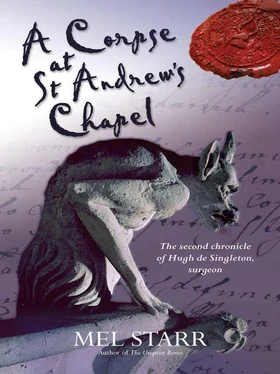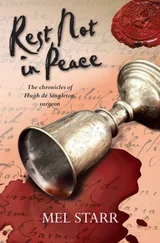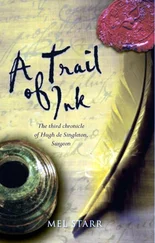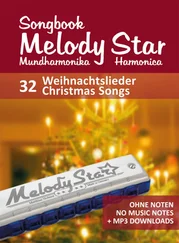Mel Starr - A Corpse at St Andrew's Chapel
Здесь есть возможность читать онлайн «Mel Starr - A Corpse at St Andrew's Chapel» весь текст электронной книги совершенно бесплатно (целиком полную версию без сокращений). В некоторых случаях можно слушать аудио, скачать через торрент в формате fb2 и присутствует краткое содержание. Год выпуска: 2010, Издательство: Kregel Publications, Жанр: Исторический детектив, на английском языке. Описание произведения, (предисловие) а так же отзывы посетителей доступны на портале библиотеки ЛибКат.
- Название:A Corpse at St Andrew's Chapel
- Автор:
- Издательство:Kregel Publications
- Жанр:
- Год:2010
- ISBN:нет данных
- Рейтинг книги:5 / 5. Голосов: 1
-
Избранное:Добавить в избранное
- Отзывы:
-
Ваша оценка:
- 100
- 1
- 2
- 3
- 4
- 5
A Corpse at St Andrew's Chapel: краткое содержание, описание и аннотация
Предлагаем к чтению аннотацию, описание, краткое содержание или предисловие (зависит от того, что написал сам автор книги «A Corpse at St Andrew's Chapel»). Если вы не нашли необходимую информацию о книге — напишите в комментариях, мы постараемся отыскать её.
A Corpse at St Andrew's Chapel — читать онлайн бесплатно полную книгу (весь текст) целиком
Ниже представлен текст книги, разбитый по страницам. Система сохранения места последней прочитанной страницы, позволяет с удобством читать онлайн бесплатно книгу «A Corpse at St Andrew's Chapel», без необходимости каждый раз заново искать на чём Вы остановились. Поставьте закладку, и сможете в любой момент перейти на страницу, на которой закончили чтение.
Интервал:
Закладка:
“Some things puzzle me,” I admitted. “His shoes…” I nodded toward the bare feet stiff at Bruce’s flank. “Where are they?”
“I think,” Shillside observed, “they will be discovered on the feet of one of those who found him this morning.”
“Mayhap, but they should not be a reward for the discovery. They are Matilda’s, to dispose of as she will.”
“Will you seek them?” the widow asked. “Cobbler could cut ’em down for me, I think.”
“I will,” I promised, and so began a journey in which I sought one thing and found another. Much of my life has been like that. I have seldom found what I most urgently sought, and only rarely sought what I found. Since much of what I enjoy is then the result of a good fortune which I knew not to seek, I attribute the laudable in my life to the will of God, who, it is written, knows what we need before we ask. He knows, for I have told him often, that I need a good wife, but no matter how I seek such a woman, she will not be found. I must not entertain these thoughts, else my mind will turn to Lady Joan Talbot, now the Lady de Burgh. Such meditations are bittersweet. I prefer to avoid them, but I cannot. Memories of Lady Joan are an itch which from time to time must be scratched.
John, Hubert and I took Alan from Bruce’s back and laid him on the bed he had shared with Matilda. He was stiffening in death, so that the corpse wished to retain the bend it had assumed while slung over the horse. Inducing him to lay straight and flat on the bed was an awkward business, especially in the presence of his weeping wife.
Shillside told Matilda that he would return in the afternoon with a jury, for any unexplained death must be examined and pronounced accidental or murder. The coroner had carried Alan’s stave all this time. He propped it in a corner of the house as we prepared to leave.
I asked the grieving widow for the blue thread. The death troubled me, but at that moment the stolen shoes annoyed most. My sense of justice was violated. It seems a small thing, now. But I was determined to find the plundered shoes this day and return them to Matilda before nightfall. I knew not if the blue thread might lead me to the thief, but if I found a garment matching the thread I might also find a man who knew more than I of this death.
Chapter 2
Dinner at Bampton Castle was a simple affair while Lord Gilbert resided elsewhere. He permitted the serving of three meats — other than fast days, of course — in his absence. Lord Gilbert was more frugal than most of his class.
I had had no breakfast, so stuffed myself on a roasted chicken, a coney pie, and cold venison. Some might think it strange that I had such an appetite after dealing with the dead all morning. My stomach is seldom discomfited. I would then sooner have had a nap, but a sense of injustice swept somnolence from my head.
I determined to visit the plowmen first, so walked left on Mill Street when I left the castle yard. I found it necessary to pause at the bridge over Shill Brook. I have seldom been able to pass a stream without gazing at the moving water. I attribute this to my childhood along the Wyre at the manor of Little Singleton. The two streams are not alike. The Wyre is slow and muddy and tidal and home mostly to eels. Shill Brook dances between narrow banks, its water pure and clear, a home to trout.
The plowmen were yet at work, their six oxen moving ponderously from one end of the strip to the other. I waited for them near the path, where they would turn for another pass down the field. In the bright light of a warm April day I saw as they approached that neither man wore a garment matching the blue thread in my pouch.
The beadle, they insisted, was shoeless when they found him. I showed them the blue thread. This was a mistake, I realized later. But that is the nature of our errors. We recognize our blunders after we have committed them. If we could see our errors as they approached, we might avoid them.
Neither of the plowmen could identify a garment of that shade. While this fruitless conversation was taking place I saw one of the men peer over my shoulder. I turned to see in the distance Hubert Shillside and eleven others of the coroner’s jury come to inspect the place where Alan lay and question those who discovered him.
I lingered to hear the plowmen answer as Shillside asked much the same questions I had asked. Their responses were the same. I was convinced they spoke the truth. And I was convinced neither had taken Alan’s shoes. The wooden-soled footwear which protected their feet was old and the leather which fixed the shoes to their feet was tattered. The beadle wore similar shoes, as did most who toil in the soil, but he would not wear shoes so worn as these. He was more prosperous than these plowmen.
Shillside and his jurymen turned back along the path to town and I followed behind, uncertain of further measures I might take. I had come to Bushey Row, fifty paces behind the coroner’s men, when it occurred to me that I might speak to the priest at St Andrew’s Chapel. This cleric was probably closest of all men to the scene of Alan’s death. Perhaps he had heard some disturbance in the night — the cry of a man or the snarl of a beast. I turned and retraced my steps.
I had returned to the place where Alan was found when in the distance I heard my name called. I turned and saw John Holcutt waving vigorously and striding purposefully in my direction. He was but a hundred paces away, just turned from Bushey Row on to the path to the chapel. He came puffing up to me a moment later.
“You are needed, Master Hugh,” he panted. “The miller was openin’ the sluice gate this mornin’ when he slipped. Stones there be mossy from the damp. Wheel began to turn and caught ’is arm as he reached to steady himself.”
“The arm is broken?” I asked.
“Prob’ly…an’ near wrenched from ’is shoulder. He’s in great pain.”
“Was he just now beginning his day? ’Tis well past noon.”
“Nay. The injury happened early. He asked ’is wife to arrange a sling and thought to continue ’is work. But he cannot, and so wishes you to attend him.”
I turned to walk back to town with the reeve. The priest at St Andrew’s Chapel would have to wait.
Andrew the miller had suffered a grievous injury. His right arm was drawn from the socket at his shoulder, and his forearm was broken. I was confused as to what steps I must take to treat the man, or more to the point, in what order I must take those steps. Had his arm been whole I would have put his dislocated shoulder right, but to do so requires leverage and tugging on the arm. This I could not do, broken as his was.
But if I should wait for the broken arm to mend, his displaced shoulder might then be so long out of joint that it could not be put right.
I explained this to the miller. I could spare him more pain, leave the shoulder as it was, and set the broken arm. Or, I could attend to the dislocated shoulder, causing him great pain in the break for a few minutes. He could suffer now, and perhaps regain the proper use of his arm, or he could avoid agony now and live his life with the affliction of a useless arm.
“’Ow can I work the mill with but one arm?” he asked.
“You may have two good arms by St Swithin’s Day if you choose to have me make your shoulder right this day. Otherwise I think you will be burdened with a crippled arm from this day on.
“I will set the break first, splint it strongly, and put a heavy layer of stiffened linen all about. Then I will see to your shoulder…but I will tell you now, the hurt will be great. I will make a potion, but it will not suffice to free you of all distress.”
The miller was not a man of strong character. He avoided affliction when at all possible. Come to think on it, so do I. So do most men. I watched the miller’s eyes as they flickered about the dusty room, as if he sought some deliverance from his condition. But there was no escape. Gradually his eyes steadied on me.
Читать дальшеИнтервал:
Закладка:
Похожие книги на «A Corpse at St Andrew's Chapel»
Представляем Вашему вниманию похожие книги на «A Corpse at St Andrew's Chapel» списком для выбора. Мы отобрали схожую по названию и смыслу литературу в надежде предоставить читателям больше вариантов отыскать новые, интересные, ещё непрочитанные произведения.
Обсуждение, отзывы о книге «A Corpse at St Andrew's Chapel» и просто собственные мнения читателей. Оставьте ваши комментарии, напишите, что Вы думаете о произведении, его смысле или главных героях. Укажите что конкретно понравилось, а что нет, и почему Вы так считаете.












